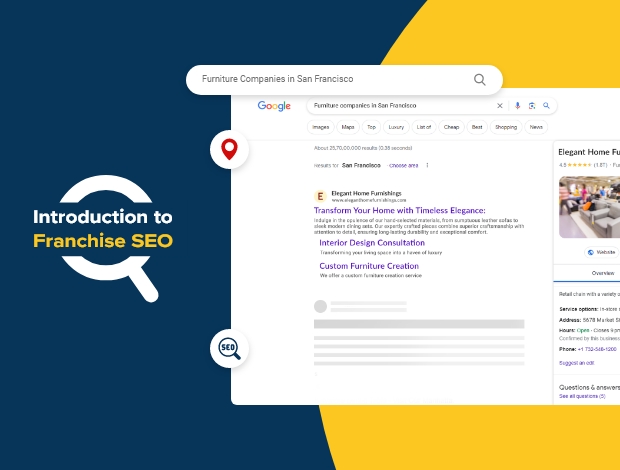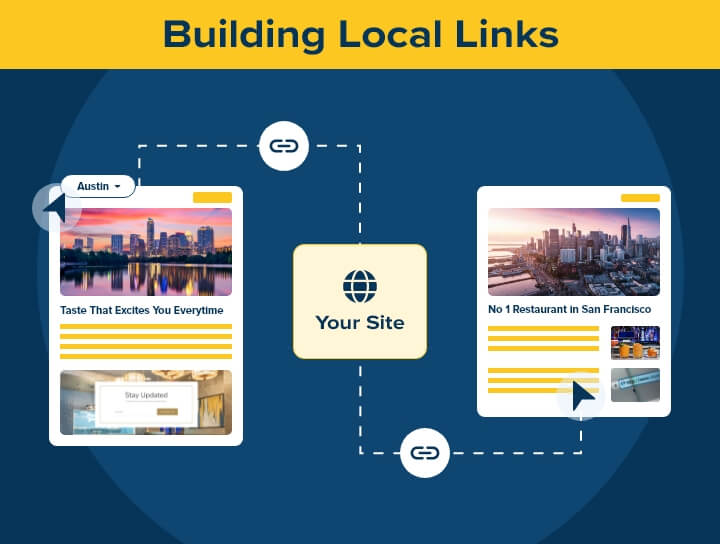
Franchise or multi-location businesses encounter unique challenges in the world of SEO, particularly when it comes to enhancing online visibility and driving impactful results through local search rankings. Given the decentralized network of franchisees and overlapping branding endeavors, it becomes increasingly complex for these businesses to establish a robust online presence and attract new customers via search engines. Nonetheless, with the correct strategy and appropriate tools, franchise businesses can surmount these hurdles and accomplish their SEO objectives.
This comprehensive guide to franchise SEO will delve into the primary obstacles faced by franchise businesses, the available solutions to overcome these challenges, and the top practices for amplifying online visibility and driving impressive results through local search rankings. By adhering to the advice and strategies encapsulated in this guide, franchise businesses can unlock the power of their online marketing efforts and thrive in the competitive landscape of digital marketing.

Understanding the Basics of Franchise SEO
Franchise SEO is a specialized form of SEO that focuses on improving the online visibility and search engine rankings of a franchise business, which have multiple locations. The importance of franchise SEO lies in the fact that the majority of consumers today turn to search engines when they’re in the market for any product or service. By optimizing each location’s digital presence to attract local customers, franchise businesses can attract new customers and increase their visibility in the local market, drive organic traffic to their sites and generate new business.
Key Components of a Franchise SEO Plan
To maximize online visibility and drive results through local search rankings, franchise businesses must have a comprehensive SEO plan in place. Some of the key components of a strong franchise SEO plan include:
- Conducting keyword research to identify target keywords and understand the needs of your target audience.
- Implementing on-page optimization techniques, such as optimizing website content, meta tags, and images, to improve search engine visibility.
- Building local citations and backlinks to establish local relevance and increase visibility in local search rankings.
Keyword research, in particular, plays a vital role in helping you understand the specific needs and preferences of your target audience in different locations. By conducting comprehensive keyword research, you can uncover the search terms and phrases that potential customers are using to find the products or services you offer.
One of the key advantages of keyword research is the ability to optimize your website and online content to align with the identified keywords. This optimization ensures that search engines recognize the relevance and value of your pages when users search for those specific keywords. By strategically incorporating these keywords into website content, meta tags, headers, and image alt tags, you can improve your organic search rankings and attract more qualified traffic to your website.
Franchise businesses operate in multiple locations, and each location may have its own set of target keywords based on local preferences, competition, and regional nuances. Keyword research helps you identify these location-specific keywords, allowing you to tailor your online marketing efforts to each specific market. By incorporating location-based keywords into your content and optimizing their website for local search, you can improve your visibility in local search engine results and attract potential customers who are searching for products or services in the franchise’s area.
Local SEO Best Practices For Franchises Businesses
Claim and Optimize Google My Business Listings
Google My Business (GMB) is a powerful tool for local SEO. Franchise businesses should claim and optimize individual GMB listings for each location. This involves providing accurate and up-to-date information, such as business name, address, phone number, website URL, and business hours. Additionally, businesses can add photos, respond to reviews, and utilize GMB posts to engage with customers and enhance their online presence.
Ensure Consistency Across Local Directories
Franchise businesses should have consistent business information across all local directories and listings. This includes directories such as Yelp, Bing Places, and industry-specific directories. Consistent NAP (Name, Address, Phone Number) data is crucial for search engines to understand and rank the business accurately. Regularly monitor and update listings to maintain consistency and establish your brand’s trust and authority with Google.
Encourage Customer Reviews
Positive customer reviews can improve the visibility and credibility of franchise businesses. Encourage customers to leave reviews on platforms like Google, Yelp, and Facebook. Responding to reviews, both positive and negative, demonstrates active engagement and enhances the brand’s reputation.
Leverage Local Keywords and Geotargeting
Franchise businesses should incorporate local keywords into website content, meta tags, headers, and image alt tags. Conducting keyword research specific to each location helps identify location-based keywords that resonate with the target audience. By optimizing content for local search, businesses can increase their visibility in local search engine results.
Build Local Citations and Backlinks
Local citations and backlinks from reputable directories, industry-specific websites, and local news publications contribute to local SEO success. Actively seek opportunities to acquire relevant local citations and backlinks by identifying keywords related to the industry and location. These citations and backlinks boost credibility and visibility in local search rankings.
Content Creation Strategies for Franchise SEO
Maximize your online visibility and drive targeted traffic to your sites by developing location-specific content that caters to the interests and needs of your target audience in each location. This can include blog posts, guides, or resources that highlight local events, news, or attractions. By creating valuable and unique content, you increase the chances of earning organic backlinks from local sources as well.
Create Localized Landing Pages
Localized landing pages are an effective way to target specific locations and improve your SEO performance in multiple locations. Follow these steps to ensure your localized landing pages are generating qualified organic traffic:
Identify Target Locations
Determine the locations you want to target and create a list of target keywords for each location.
Research Local Content
Conduct thorough research on each location, including its demographics, culture, local events, and business landscape. This will help you create content that resonates with the local audience.
Create Unique Landing Pages
Develop individual landing pages for each location, optimizing them with location-specific keywords, meta tags, and descriptions. Include localized content, such as testimonials from local customers or references to local landmarks.
Optimize On-Page Elements
Ensure that the landing pages have optimized on-page elements, including headings, subheadings, URLs, and image alt tags. Incorporate local keywords naturally within the content.
Monitor and Optimize
Regularly monitor the performance of each landing page using analytics tools. Make necessary adjustments to improve rankings and user engagement in each target location.
Write Localized Blog Content
Localized Blogging allows you to create fresh and informative content that can attract local audiences and boost your multi-location SEO efforts. Follow these steps to ensure your localized blogs or guides are generating qualified organic traffic:
Understand Local Interests
Research the interests, pain points, and questions of your target audience in each location. This will help you create relevant and engaging blog topics.
Develop a Content Calendar
Plan a content calendar that includes blog topics targeting each location. Incorporate keywords related to the target locations into the blog titles and content.
Write High-Quality Content
Create well-written and informative blog posts that address the needs of your local audience. Incorporate local keywords naturally and provide valuable insights.
Promote Local Events and News
Stay updated on local events, news, and trends in each location. Create blog posts that highlight these events and provide useful information to readers.
Encourage User Engagement
Include calls-to-action in your blog posts to encourage local readers to engage with your content. Ask for comments, feedback, and social media shares to boost visibility and reach.
Link Building Strategies for Franchise SEO
Local citations and backlinks are important factors that search engines consider when determining the credibility and authority of a website. By identifying keywords related to your industry and location, you can actively seek opportunities to acquire relevant local citations and backlinks. These citations and backlinks from reputable local directories, industry-specific websites, and local news publications can significantly boost your visibility in local search rankings.
For franchise businesses, link building serves multiple purposes. It not only strengthens the authority and reputation of your franchise brand but also enhances the visibility of individual location pages. By acquiring relevant and high-quality links, you increase the chances of appearing in local search results, driving targeted traffic to your franchise locations.
Building Local Links

To maximize your franchise SEO efforts, it’s essential to focus on building local links. These are links from websites that are geographically relevant to your franchise locations. Here are some effective strategies for acquiring local links:
Partner with Local Businesses
Forge partnerships with complementary local businesses in your area. This can involve collaborations, co-marketing initiatives, or content sharing. By leveraging these partnerships, you can generate valuable backlinks from trusted local sources.
Sponsor Local Events
Sponsoring local events not only demonstrates your franchise’s commitment to the community but also provides opportunities to earn backlinks. When you support local initiatives and organizations, they are more likely to mention and link to your franchise’s website or location pages.
Engage with Local Influencers
Identify influential individuals or organizations in your community, such as bloggers, social media personalities, or industry experts. Engaging with them and providing valuable content can lead to natural backlinks and increased visibility among your target audience.
Monitoring and Adjusting Your Franchise SEO Strategy
The franchise SEO landscape is constantly evolving, and staying informed about the latest trends and algorithm updates is crucial. Follow reputable industry blogs, attend conferences, and engage with SEO communities to stay ahead of the curve and adapt your strategies accordingly.
 Free
Consultation
Free
Consultation Free
Google Ads Audit
Free
Google Ads Audit








